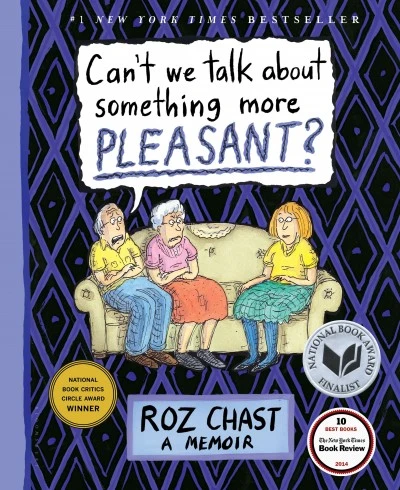“Can’t We Talk About Something Pleasant” by Roz Chast (Bloomsbury, 2014, $19)
Originally published in 2014, “Can’t We Talk About Something More Pleasant” won Roz Chast a National Book Critics Circle Award for autobiography and was also a finalist for the National Book Award. Of course, awards are nothing new for Chast, a staff cartoonist for The New Yorker. Since 1978, she has published more than 800 cartoons in that magazine while also contributing to Scientific American and the Harvard Business Review. In recognition of her work, the Comics Alliance listed Chast as one of 12 female cartoonists deserving of lifetime achievement recognition.
She was elected to the American Philosophical Society in 2010. In May of 2017, she received the Alumni Award for Artistic Achievement at the Rhode Island School of Design commencement ceremony. Chast also holds honorary doctorates from Pratt Institute, Dartmouth College and the Art Institute of Boston at Leslie University.
“Can’t We Talk” is Chast’s first memoir, focusing on the last years of her parents’ lives. Chast grew up in the Flatbush section of Brooklyn, the only child of George Chast, a high school French and Spanish teacher, and Elizabeth Chast, an assistant principal in an elementary school. Her parents were children during the Great Depression and, as for many, this had a great influence on their lives and that of their daughter, who was born in 1954.
Illustrated with Chast’s distinctive cartoons, the bool addresses a very difficult subject matter in a candid, poignant, caring and honest fashion, leavened with art and her humor. That subject matter is, of course, watching the physical degradation and mental decline of people you love.
As Chast makes clear, the aging process is difficult, expensive, excessively worrisome and heart-breaking. If you have ever had a friend or a family member in an assisted living facility or a memory care facility, you will identify with Chast’s writing. Chast also spends time addressing the topic of sorting and disposing of the family possessions, the physical embodiment her parents’ life together.
Contact Ted Ayres at ted.ayres@shockers.wichita.edu.








